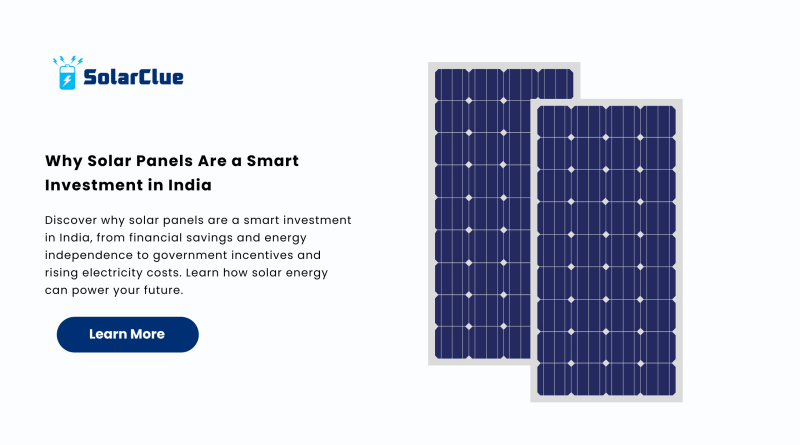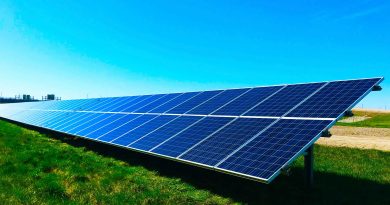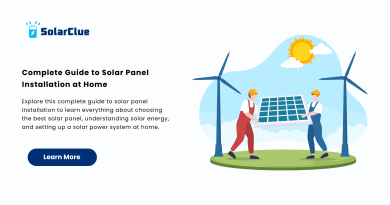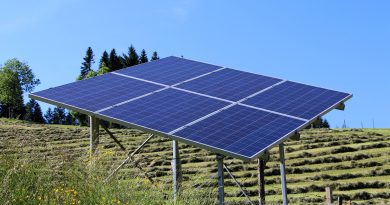Why Solar Panels Are a Smart Investment in India
India is at the forefront of a renewable revolution, and more homeowners and businesses are making the shift to solar panels every day. With rising electricity prices, environmental concerns, and attractive government subsidies, investing in a solar power system is no longer a luxury—it’s a smart, future-proof decision. In this blog, we’ll explore why solar panels are a smart investment in India, how they benefit you financially, environmentally, and practically, and what makes them an essential part of India’s energy future.
Table of Contents
- 1 The Rising Demand for Solar Energy in India
- 2 1. Financial Benefits of Solar Panel Investment
- 3 2. Lucrative Government Incentives and Subsidies
- 4 3. Increase in Property Value
- 5 4. Reliable Power Supply and Energy Independence
- 6 5. Eco-Friendly and Sustainable Living
- 7 6. Low Maintenance and Long Lifespan
- 8 7. Technological Advancements and Cost Reduction
- 9 8. Wide Range of Applications
- 10 9. Support for Make in India and Atmanirbhar Bharat
- 11 10. Ideal for Indian Climate and Conditions
- 12 FAQs
The Rising Demand for Solar Energy in India
India’s climate makes it one of the most suitable countries in the world for generating solar energy. With over 300 sunny days a year and increasing energy demands, solar panels provide a clean, consistent, and reliable power source. From metropolitan cities to rural areas, solar adoption is growing rapidly. The Indian government’s strong push through initiatives like PM Surya Ghar Yojana and Rooftop Solar Programme has made solar power systems more accessible and affordable than ever.
1. Financial Benefits of Solar Panel Investment
Save Big on Electricity Bills
Once installed, solar panels significantly reduce your monthly electricity expenses. By generating your own electricity, you become less reliant on the grid. Over time, these savings add up, and most users find their solar power system pays for itself within 4 to 6 years. After that, it’s almost free electricity for 20–25 years!
Protection Against Rising Tariffs
Electricity costs in India have been rising steadily. Investing in solar energy shields you from unpredictable tariff hikes. It gives you control over your energy bills, regardless of changes in utility rates.
2. Lucrative Government Incentives and Subsidies
The Indian government offers substantial financial support to promote solar panel adoption. These include:
-
Subsidies up to 40% on residential rooftop solar power systems
-
Net metering, which allows users to earn money by selling excess energy back to the grid
-
Income tax benefits for businesses investing in renewable energy
These incentives reduce the upfront cost and accelerate return on investment, making solar panels a smart investment in India.
3. Increase in Property Value
Homes with solar power systems are not only energy-efficient but also more attractive to potential buyers. Multiple studies have shown that homes with solar panels sell faster and often at a higher price. Buyers see value in lower utility bills and a sustainable lifestyle.
4. Reliable Power Supply and Energy Independence
India still faces power cuts, especially in tier-2 and tier-3 cities. A solar energy setup with battery backup ensures uninterrupted electricity even during outages. With grid-tied or hybrid solar power systems, you become more self-reliant and energy independent.
5. Eco-Friendly and Sustainable Living
By choosing solar panels, you are reducing your carbon footprint and contributing to a cleaner planet. A typical solar power system offsets several tons of CO₂ annually, making it one of the most effective ways to combat climate change on an individual level.
6. Low Maintenance and Long Lifespan
Modern solar panels are designed to withstand extreme weather conditions in India, from scorching summers to monsoon rains. With minimal maintenance, they last 25 years or more. Occasional cleaning and annual check-ups are usually enough to keep your solar energy system performing optimally.
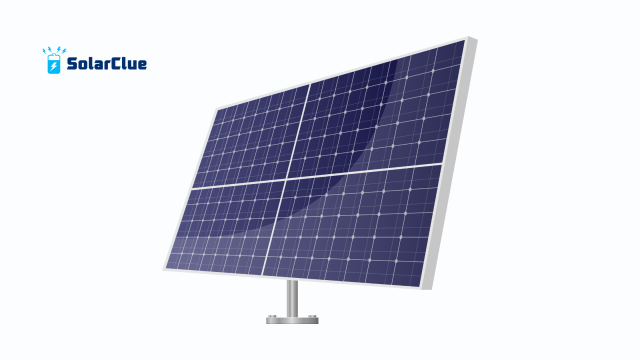
7. Technological Advancements and Cost Reduction
The cost of solar panels has significantly decreased in the past decade, while efficiency has improved. Today’s solar power systems come with smart monitoring apps, sleek designs, and improved energy outputs. This combination of affordability and efficiency ensures a quicker ROI and better performance.
8. Wide Range of Applications
Whether it’s a home, shop, school, hospital, or factory, solar panels can power anything. From small 1 kW systems to industrial-grade installations, there’s a solar energy solution for every need. Solar water heaters, solar street lights, and solar-powered pumps further expand the usability of this renewable energy.
9. Support for Make in India and Atmanirbhar Bharat
Investing in solar panels also supports India’s broader goals of self-reliance. Many solar manufacturers are part of the Make in India initiative, creating jobs and reducing dependency on imported fossil fuels. When you install a solar power system, you’re not just powering your home—you’re contributing to national progress.
10. Ideal for Indian Climate and Conditions
India’s geography and sunlight availability make it ideal for solar energy. Even in monsoons or cloudy days, today’s solar panels can still generate decent electricity thanks to advanced technology like PERC and bifacial panels. This consistency makes solar panels a smart investment in India across all seasons.
FAQs
Q1. How much does a solar panel system cost in India?
A basic 1 kW solar power system costs around ₹60,000–₹80,000 after subsidies. Prices vary based on panel type, inverter quality, and installation complexity.
Q2. Can I power my entire home with solar energy?
Yes, with proper system sizing and battery backup, you can meet 100% of your home’s energy needs using solar panels.
Q3. Are government subsidies available for commercial users?
Subsidies are primarily for residential users, but commercial entities can benefit through tax depreciation, REC markets, and other incentives.
Q4. What is the lifespan of a solar panel?
Most solar panels come with a 25-year performance warranty and can last even longer with good maintenance.
Q5. Is solar viable during the monsoon or in less sunny regions?
Yes, even during cloudy weather, solar energy systems generate power using diffused sunlight. Efficiency may drop slightly but not significantly.
By now, it’s clear why solar panels are a smart investment in India—they reduce electricity bills, offer government support, ensure energy independence, and promote a greener future. If you’re ready to take a step toward energy freedom, visit SolarClue.com or explore helpful resources and insights at blog.SolarClue.com. Your smart investment starts here.

